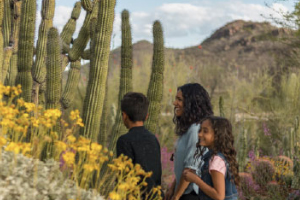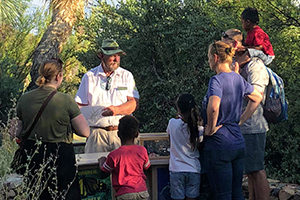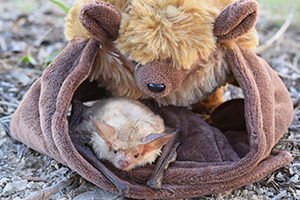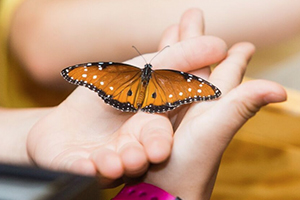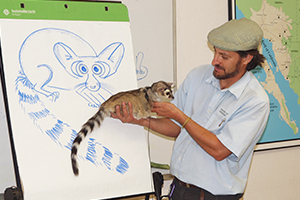Migratory Pollinators Program
Table 8.
Important populations of nectar
plants used by rufous hummingbirds and other species that warrant protection.
1. Dense stands of chuparrosa and ocotillo at Cerro Prieto north of Puerto Lobos are important nectar resources in the northward spring migration in March. Farther north along the coast of the Gulf of California, rocky habitats, and thus chuparrosas and ocotillos are rare or absent. The vegetation is Sonoran desertscrub. Coordinates: 30°18'28"N 112°49'30"W; 10 m elevation.
2. El Doctor is a desert oasis in northwestern Sonora. It is a critical source of water and food for large numbers of rufous hummingbirds stressed after crossing the desert in route to California in March and May. In early April of 2002, they were feeding at honey mesquite (Prosopis glandulosa). The nearby vegetation is a sparse Sonoran desertscrub. In the oasis, the vegetation is a riparian community dominated by screwbean (Prosopis pubescens) and honey mesquites, and the introduced saltcedar (Tamarix pentandra). Coordinates: 31°56'55"N 114°44'57"W; 20 m elevation.
Spring: Plains of Sonora Corridor
3. Dense stands of tree ocotillo near Microondas (Microwave) La Colmena, 1.8 km south of Los Chinos, 77.5 km north of Hermosillo, consistently attracts northward migrating rufous hummingbirds in February-March while nearby, similar-appearing stands have few or no birds. Karen Krebbs' observation of 78 individuals in a few hours on February 27, 2002 is the most rufous observed in Sonora during spring migration. The vegetation is a dense Sonoran desertscrub with foothills thornscrub on the emergent hills. Coordinates: 29°46'33"N 111°03'15"W; 665 m elevation.
4. Cerro de las Trincheras is an archeological site on the edge of the town of Trincheras, famous for hundreds of enigmatic prehistoric rock walls. In early April of 2002, a dense stand of ocotillos supported a large breeding population of broad-billed hummingbirds as well as a few resident Costa's and migratory black-chinned hummingbirds (Archilochus alexandri). The rufous hummingbirds observed in the tree ocotillo stands to the southeast in the Plains of Sonora Corridor likely passed through the area earlier in March in route to California. The interactions of the resident and migratory hummingbirds in the ocotillo stand warrant study. A massive southeastward flight of monarch butterflies passed through the area in October of 2001. The vegetation is Sonoran desertscrub. Coordinates: 30°23'45"N 111°32'13"W; 515 m elevation.
Spring: Foothills Corridor
5. The bird fauna at Loma Maderista on the west side of the Río Yaqui just downstream from Tónichi is very diverse including six species of hummingbirds. In March of 2000 and 2001, large numbers of rufous hummingbirds visited tree ocotillos. The importance of the eastern Foothills Corridor was not appreciated prior to the present study. The vegetation is foothills thornscrub. Coordinates: 28°34'30"N 109°33'40"W; 220 m elevation.
6. Arroyo Los Huerigos near San Nicolás is rich riparian area in east central Sonora that supports a great variety of birds. Very large stands of the red-flowered limita as well as rama del toro and tree tobacco attract six species of hummingbirds including rufous in spring. The vegetation on the slopes is tropical deciduous forest with a Sonoran cottonwood (= Huerigos)-Bonpland willow riparian gallery forest in the stream canyon. Coordinates: 28°25'48"N 109°11'31"W; 650 m elevation.
Summer: Lowland River Valley Corridors
7. Although very large numbers of rufous, black-chinned, and Anna's (Calypte anna) hummingbirds migrate southward through the Río Magdalena and Río Sonora River Valleys in northern Sonora in August-October, there are relatively few large patches of nectar plants. A very large population of the introduced tree tobacco along the Río Sonora, 8.2 km north of Banámichi stands out as an important nectar resource. Abundant breeding broad-billed hummingbirds on July 17 were displaced by abundant migratory Black-chinned with a few rufous and Anna's on September 25. The vegetation on the slopes is foothills thornscrub with mesquite bosque along the river. Coordinates: 30°05'52"N 110°14'49"W; 890 m elevation.
Summer: Sierra Madre Corridor
8. El Aguajito is west of Yécora in Barranca Honda on the north face of Mesa del Campanero in the Sierra Madre Occidental of eastern Sonora. This shady sycamore-fern bank canyon has one of the most diverse bird faunas in Sonora as well as several rare plants. Dense stands of pineapple sage, which flowers all year, and tree tobacco attract seven species of hummingbirds. In August of 2000, two female berylline hummingbirds (Amazilia beryllina) were observed building nests, establishing El Aguajito as the only known Sonoran breeding site for the species. Rufous hummingbirds pass through in both the northward spring (March) and southward summer-fall (September) migrations. The vegetation is pine-oak forest on the slopes and sycamore-pine forest in the canyon bottom. Coordinates: 28°22'18"N 109°02'54"W; 1640 m elevation.
9. Barranca El Salto is a steep, rocky stream canyon on the west edge of Mesa del Campanero west of Yécora. The only Sonoran stands of Durango fir (Abies durangensis) are in the canyon. Thick-billed parrots (Rhynchopsitta pachyrhyncha) formerly visited Mesa del Campanero in November to harvest seeds from the massive cones of southwestern white pine (Pinus strobiformis). On three separate days in September 2001, a dense population of Texas betony attracted eleven species of hummingbirds; only thirteen species have been recorded in the area. In addition to large numbers of rufous, black-chinned, broad-tailed (Selasphorus platycercus), and Anna's hummingbirds migrating through the area, broad-billed and Costa's moved upward through tropical deciduous forest in Arroyo El Reparo to utilize a montane forest resource. Coordinates: 28°19'31"N 109°02'W; 2000 m elevation. Top of Page | Previous Page

